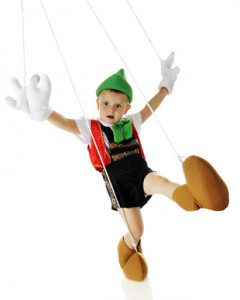Children Are Not Our Puppets
Our children taught us an important lesson when they were mere toddlers. It’s true. I remember the lesson clearly. They told us by their actions and words: “We are not your puppets. You cannot control us.” They remind us of this fact every time we offer to help them and they say “No, I do” in their broken toddler English…or, when we tell them not to do something and they smile at us before doing it anyway. Children are not our puppets. They will not allow us to control them.
 Most parents still try to exert some level of control over their children. For instance:
Most parents still try to exert some level of control over their children. For instance:
- We fear for our children’s safety so we control their actions with rigid rules and expectations.
- In an effort to protect our children from emotional pain and hurt, we hover over their lives and become involved in every activity and stick our nose in all their drama trying to control every outcome.
- In anger at their disobedience or “attitude” we step back, distancing ourselves and withholding love at a time when they likely need to know our love is unconditional and never ending.
- We may even try to change them by inducing guilt with statements like “Your mother would be so disappointed’ or “after all I’ve done for you….”
I’m sure you recognize some of these actions in yourself. I know I do. We attempt to control our children out of fear. Nonetheless, our children are not our puppets. They will not be controlled. Like Pinocchio, they do not want to be puppets. They want to be “real” boys and girls.
In all reality, our children are right. We hurt our children when we control them. Research suggests:
- Controlling our children crushes their self-confidence. It leaves our children with a chronic sense of guilt, a belief that something is inherently wrong with them…that they are bad.
- Children who grow up with over-controlling parents tend to be hypercritical of themselves and others. Critical of themselves, they struggle with a positive self-image. Critical of others, they can struggle with friendships.
- Since over-controlling parents make every (or almost every) decision for their children, their children become dependent. They do no learn to think independently and make their own decisions. They rely on others to do their thinking for them.
- Children who feel controlled may lie, sneak, or openly rebel in an effort to establish their own identity and have the opportunity to “think for themselves.”
- Since over-controlled children do not learn healthy ways to assert themselves and confidently express their opinions, they have greater difficulty in relationships when they become adults as well.
Our children are right. They are not our puppets. We do them a disservice when we attempt to control them. We interfere with them developing a healthy self-image, intimate relationships, and the ability to assertively stand up for what they believe. What can a parent do to cut the puppet strings and let go of control? Read Cut the Puppet Strings to discover five actions that will do the trick!